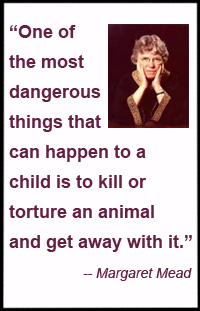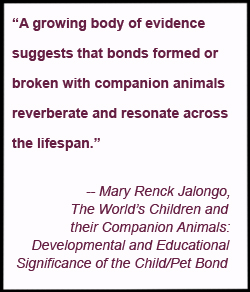It is often thought that when children are cruel to animals it is an exploratory stage of development. This may be partly true but the intensity, frequency and motivation for their actions must be considered. When a child grows up in an environment filled with violence — as a witness, victim or perpetrator — there may be many factors behind his or her motivation to harm animals.
Link researchers have connected children’s acts of animal abuse with bullying, corporal punishment, school shootings, sexual abuse, and developmental psychopathic behaviors. Children often feel powerless when they are abused by adults and may find their own victims to exert control over and gain a sense of power. They may abuse a pet of a sibling or peer for revenge or emotional maltreatment. Animal abuse can also be part of an initiation ritual for becoming a gang member. Adolescents have been known to videotape their torturing of animals to play back later when they feel bored.
All animal abuse situations must be taken seriously. Understanding why children may abuse animals is the key to appropriate intervention strategies.
What are the effects of animal abuse on abusers?
Animal abuse can be an indicator and a predictor of other violent acts. This has been well documented in numerous research studies and has led to animal abuse being listed as one of the criteria for a diagnosis of conduct disorder in childhood. Abusers and impressionable children who witness abuse become desensitized to violence and the ability to empathize with the victim. It is well known that abuse is often cyclical and that the only way to stop the cycle is intervention; the earlier the intervention the higher rate of success.
Not all children who abuse animals grow up to become serial killers… but a child who does display unusual or continual fascination with harming animals is in need of professional counseling. Several psychological assessment tools are available to help therapists respond to juvenile animal abuse, both in clinical settings and as part of sentencing adjudication.
What should I do if animal abuse is suspected?
Identifying cases of animal abuse as soon as possible enhances the safety and well-being of children, animals, other family members and the community. Assess the seriousness of the situation: talk to the child and friends, teachers and classmates to try to uncover the child’s motivations. The incident could be exploratory, pathological, delinquent or criminal in nature or in response to mental health issues or reaction to trauma. A trusted family member, friend, teacher, counselor or therapist may be brought in to the discussion.
The child should be held accountable for the actions and made to appreciate empathy for the animal’s feelings. In more serious incidents, counseling, other professional intervention, referrals to other social services agencies, or the filing of criminal charges may be warranted. A child’s revelation of other family violence may require reporting to child protection officials, and to animal care & control officials for removal of the animals.


